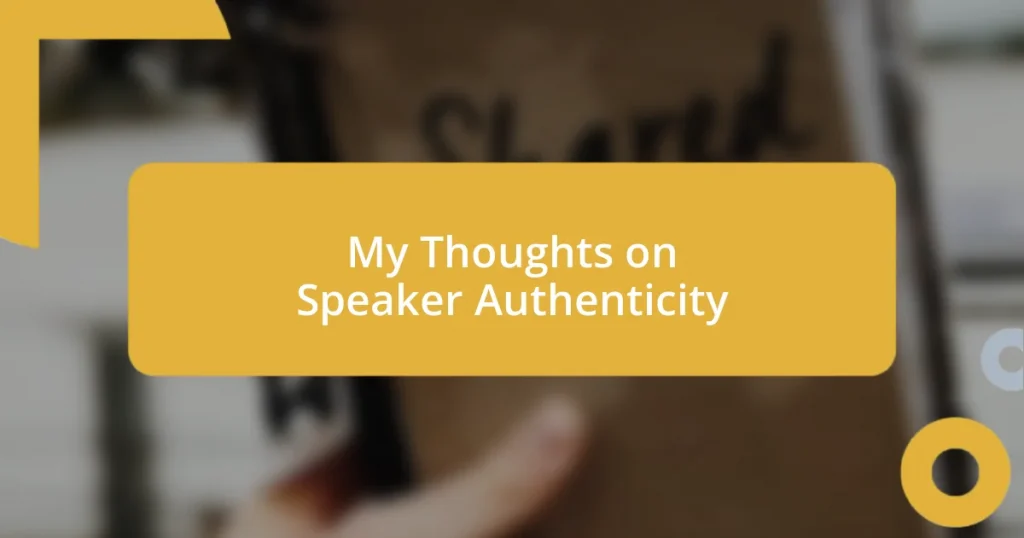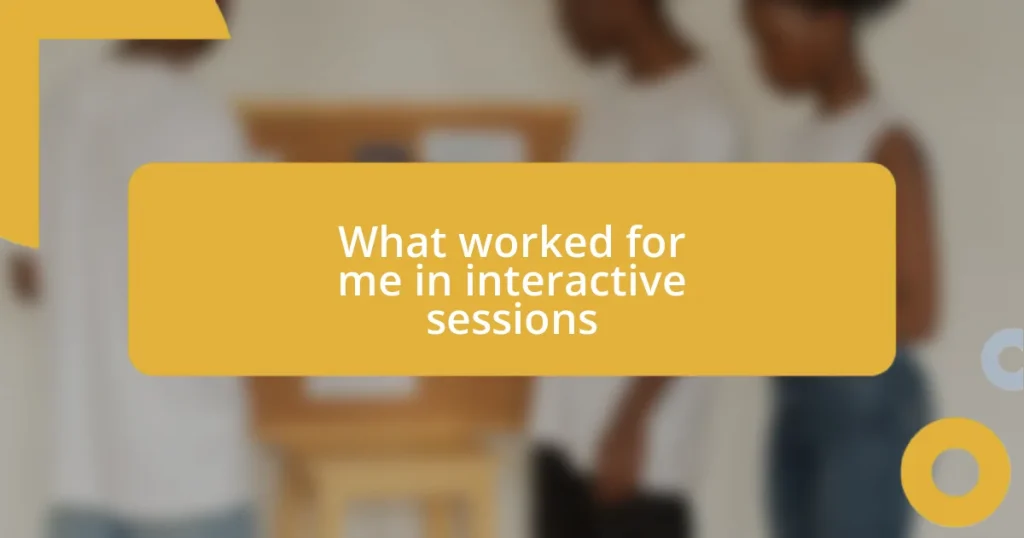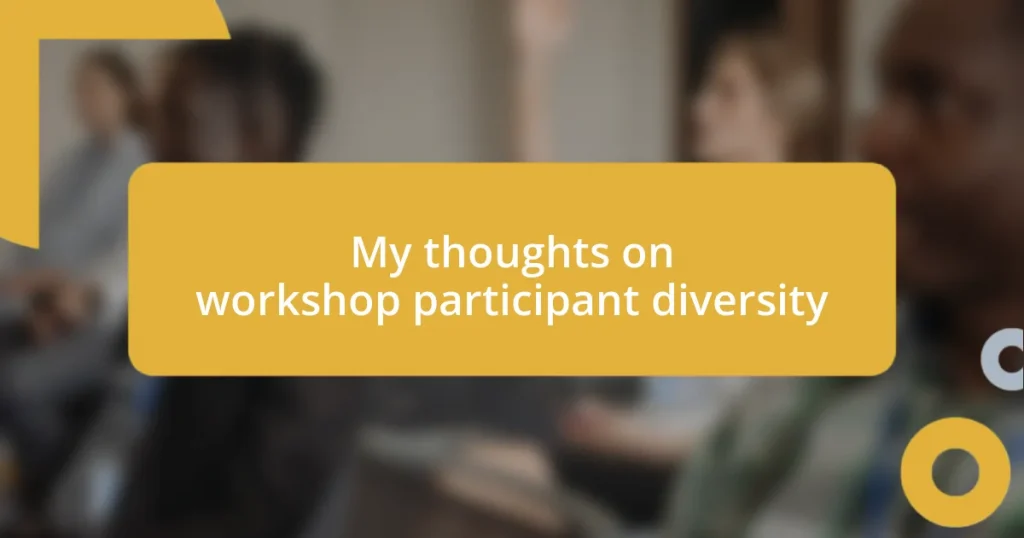Key takeaways:
- Speaker authenticity fosters genuine connections through vulnerability, storytelling, and staying true to personal values.
- Key traits of authentic speakers include genuineness, emotional connection, transparency, and audience engagement.
- Overcoming barriers such as fear and societal expectations is essential for developing authenticity and creating meaningful interactions.
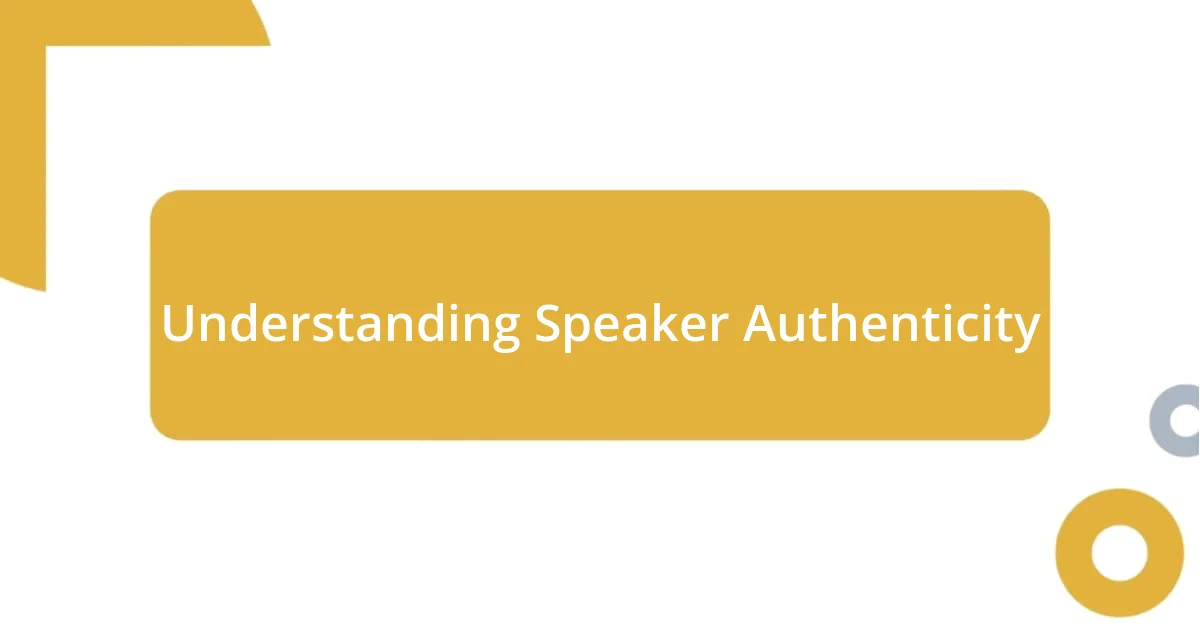
Understanding Speaker Authenticity
Speaker authenticity is all about being genuine and relatable, which I believe is what truly resonates with an audience. Think about a time when you heard a speaker who seemed real and open; didn’t it make their message hit home much harder? I often find that when speakers share their vulnerabilities, it breaks down walls and invites trust.
When I reflect on my own experiences as an audience member, I remember a motivational talk where the speaker poured their heart out about overcoming personal struggles. That level of honesty is what I crave as a listener—it’s refreshing and reminds us that we’re all human, facing challenges along the way. Have you ever noticed that the most memorable talks often include personal stories that reveal the speaker’s true self? That’s authenticity in action.
Moreover, authenticity isn’t just about sharing stories; it also involves staying true to one’s values and beliefs. In my view, when speakers maintain that alignment, they exude a confidence that captivates the audience. This is why authenticity is not just a buzzword; it’s a fundamental aspect of effective communication that allows for real connections to flourish.

Importance of Authenticity in Speaking
The importance of authenticity in speaking cannot be overstated. Authentic speakers establish a rapport with their audience, fostering a sense of connection that draws people in. I once attended a seminar where the speaker was not afraid to share their failures, coupled with their successes. That openness made me reflect on my own journey and inspired me to embrace my imperfections rather than hide them.
When a speaker communicates authentically, it often transforms the atmosphere in the room. I remember participating in a workshop where the facilitator shared their personal fears about public speaking. This vulnerability created a safe space for everyone to share their own fears. It’s these shared experiences that bridge gaps, turning a simple talk into a meaningful exchange of ideas and emotions.
Moreover, authenticity in speaking reinforces credibility. As someone who actively engages in public forums, I have found that when I present my thoughts without pretense, the audience responds positively. They appreciate the honesty and are more likely to engage and ask questions. Authenticity builds trust, and in this digital age, that’s an invaluable currency for effective communication.
| Aspect | Authentic Speaker |
|---|---|
| Connection | Establishes genuine rapport with audience |
| Vulnerability | Shares personal struggles alongside successes |
| Trust | Builds credibility through honesty |
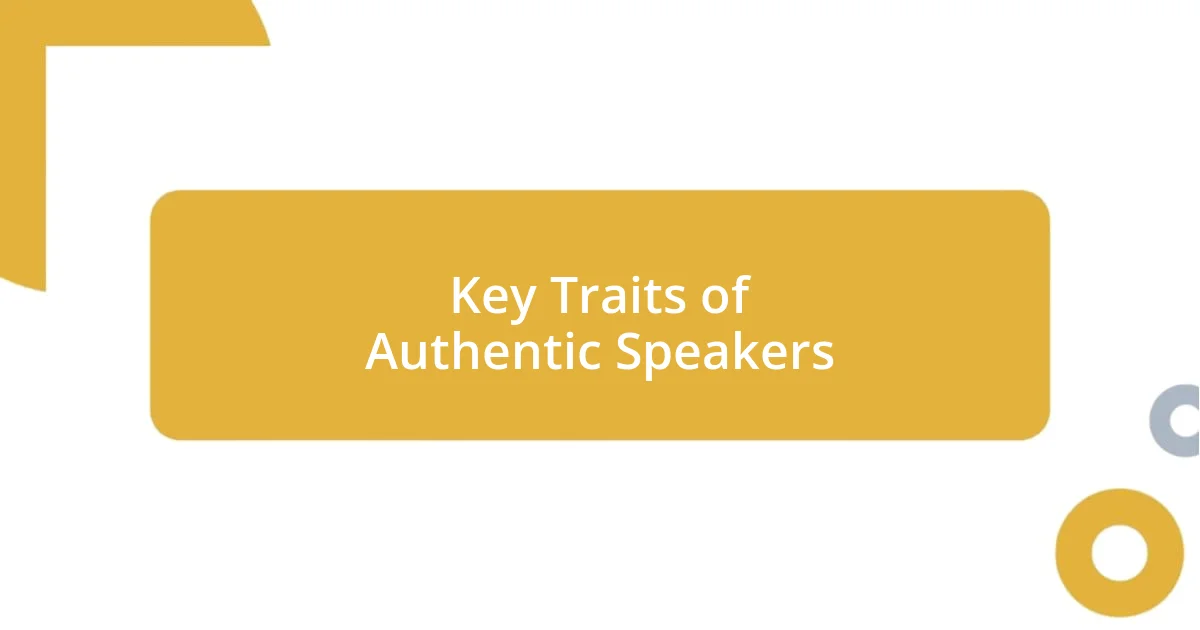
Key Traits of Authentic Speakers
Authentic speakers often exude a certain energy that captivates their audience. I remember a TED talk I watched where the speaker passionately shared their journey from failure to triumph. The raw emotion in their voice and the sparkle in their eyes made it impossible not to feel connected to their narrative. It wasn’t just about what they were saying; it was how they made me feel, highlighting the importance of emotional resonance in authentic speaking.
Here are some key traits that define authentic speakers:
- Genuineness: They are true to themselves and avoid putting on a facade.
- Emotional Connection: They create bonds through shared experiences and heartfelt storytelling.
- Transparency: They openly discuss both their successes and failures, making their message relatable.
- Engagement: They actively involve their audience, encouraging participation and interaction.
By observing these traits, I’ve discovered that authenticity isn’t merely a technique; it’s a mindset that fosters deeper connections and understanding between the speaker and the audience. I often find myself drawn to speakers who embody these characteristics, as they invite me not just to listen, but to truly engage with their message.

Strategies for Developing Authenticity
To develop authenticity in speaking, one of the most effective strategies is to embrace self-reflection. I’ve often found that taking time to understand my own beliefs, values, and experiences adds depth to my presentations. For instance, after reflecting on my early struggles with confidence, I shared that journey with audiences, which transformed my narratives. Have you ever considered how your own story can resonate with others in a meaningful way?
Another strategy that has worked well for me is practicing vulnerability. When I first started speaking publicly, I hesitated to share my failures, fearing judgment. However, once I began to open up about my missteps, I noticed a shift in audience engagement. People started to relate to me on a more personal level. The atmosphere felt lighter, almost inviting, as others began sharing their stories too. Vulnerability isn’t just about admitting weaknesses; it’s about fostering a space where everyone feels comfortable being real.
Finally, focusing on active listening can significantly enhance your authenticity as a speaker. I remember a workshop where the facilitator encouraged us to engage with our audience through questions rather than just delivering a monologue. This approach made the session feel like a conversation, and I quickly realized how much it enriched the experience. When speakers actively listen, they not only adapt their messages in real-time but also show their audience that they truly value their input. Have you tried incorporating audience feedback into your talks? It can be a game changer!

Overcoming Barriers to Authenticity
There are often invisible hurdles that can hinder authenticity in speaking. One barrier I’ve encountered is the pressure to conform to certain expectations—whether it’s adhering to a formal style or using industry jargon. I remember feeling overwhelmed in professional settings, where the focus seemed to be on sounding knowledgeable rather than being genuine. Have you ever felt like you had to wear a mask just to fit in? When I allowed myself to break away from that mold, I discovered that authenticity resonates far more than polished delivery.
Another challenge lies in fear—fear of judgment, of being vulnerable, or of not meeting audience expectations. I still recall a time when I shared a personal story that I thought was going to flop. Instead, it sparked a wave of conversation and connection; my vulnerability drew people in. It taught me that embracing these fears can lead to more meaningful interactions. What fears do you hold that might be keeping you from being your true self?
Finally, I believe that surrounding ourselves with supportive communities can be pivotal in overcoming authenticity barriers. For example, when I attended a speaking group that encouraged open sharing, it felt safe to be myself, flaws and all. This environment not only boosted my confidence but also transformed my approach to speaking. Have you sought out circles that champion authenticity? Finding such spaces can empower us to shed our inhibitions and speak from the heart.

Real Examples of Authentic Speakers
One of my favorite authentic speakers is Brené Brown. I vividly recall watching her TED Talk about vulnerability, where she openly shared her own struggles with shame and connection. It wasn’t just her words that resonated—it was the genuine emotion behind them. Have you noticed how her sincerity allows her audience to feel safe in expressing their own vulnerabilities? I often wonder what it must be like to have such an impactful presence.
Another powerful example is Simon Sinek, who speaks with a clarity that feels refreshing. I remember attending a conference where he shared his insights on “Start With Why.” What struck me was his ability to connect personal stories with broader ideas, making a complex topic feel relatable. I found myself hanging onto every word, almost as if we were having a one-on-one conversation. How do you think your own stories could create that kind of connection in your talks?
Lastly, Michelle Obama embodies authenticity in her speeches. When she connects her personal journey and values with her message, the authenticity shines through. I distinctly remember feeling a wave of inspiration wash over me when she recounted her experiences in the White House, discussing both triumphs and challenges. It made me reflect on the obstacles I face in my own life. Have you ever felt that electric charge in the room when an authentic speaker shared their story? It creates an atmosphere of trust and openness that is simply undeniable.










